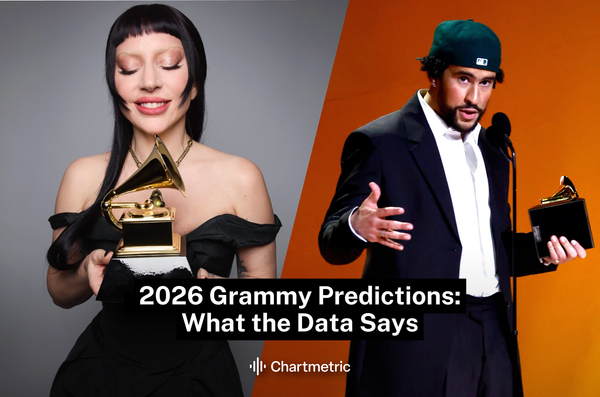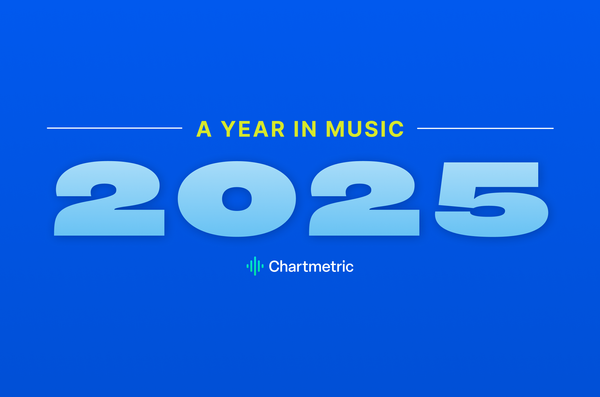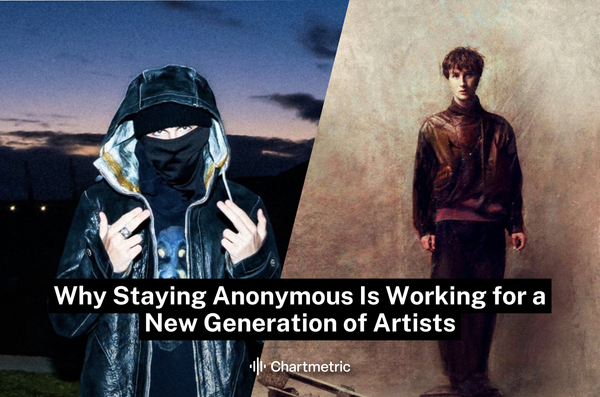By Sarah Kloboves and Melina Raglin
For American Gen Zers, the term “drum and bass” is most likely new to their vocabulary. The sound? Well, chances are they heard it for the first time as a result of the COVID-19 pandemic, either on TikTok or sprinkled into an American house or dubstep set. As for Gen Zers in the U.K., drum and bass was the music a friend's brother played at house parties in high school. It’s nothing new - in fact, it’s what they grew up on.
As two of the music industry’s largest markets, the export relationship between the U.K. and the U.S. is historically one of the strongest. We see it dating back to the “British Invasion” in the 1960’s, and can even point to more recent examples in genres like rap and drill. That being said, one of the most long-standing pipelines exists specifically within the electronic music ecosystem. From house to dubstep, these EDM subgenres have gone back and forth across the pond a time or two, with the latest craze being the U.K.’s very own 170 bpm golden child: drum and bass, aka DnB.
Dubstep and the culture of UK electronic music
To help understand the current trajectory of drum and bass in the U.S., it’s important to first take a look at its predecessors. Born out of South London at the dawn of the millennium, dubstep emerged as an offshoot of U.K. garage and was typically identified by its two-step rhythms and dub basslines. The genre rapidly gained popularity through the mid-2000s and broke through the British mainstream around 2010, thriving specifically on local sounds and scenes. At least that was the case until Skrillex entered the scene.
In 2011, LA-based DJ and producer Sonny More, better known as Skrillex, began the American development of dubstep, eventually leading to “brostep” and the birth of modern U.S. rave culture. Because many in the U.S. were hearing these sounds for the first time, the sonic view of mainstream dubstep quickly morphed into this new rendition. In fact, its commercial success was so great that currently half of the top 10 dubstep artists by Chartmetric score are Americans.
However, the unfamiliar bass-heavy sounds of U.S. dubstep have deep roots in the U.K.’s musical and cultural history, tracing back to one particular genre: jungle. Jungle was born in the early 90s at the forefront of rave culture, distinguished by its echoey basslines, vocal samples, and heavy drums. Many of these key auditory motifs were sourced directly from genres like reggae and ska, imported to the U.K. by Jamaican and Caribbean immigrants in the 60s and 70s. Despite the mainstream music industry’s rejection of the genre, jungle continued to thrive in the underground scene, eventually paving the way for speedy drum and bass breaks, two-step U.K. garage grooves, and heavy dubstep basslines, all sounds well-known and loved by ravers across the globe.
Today’s landscape of U.K.-born electronic music
After witnessing the Americanization of dubstep, one might question whether drum and bass is next up on the list of genres to break into the U.S. mainstream. Yet, one thing is certain — DnB’s popularity is growing on a global scale.
Zeroing in on electronic music’s most followed Spotify playlist, Mint, there’s been a clear upward trend in tracks from drum and bass artists that have been added since the beginning of the COVID pandemic. Growing from just 77 tracks in 2020, in 2023 the playlist saw 101 tracks added from drum and bass artists, out of 379 total for the year. This equates to nearly a third of all tracks added — an impressive feat as Mint features songs from all subgenres of EDM.
As the top editorial playlist for DnB music, Spotify’s “Massive Drum & Bass” has steadily grown in popularity, with its audience doubling throughout 2023 to where it is now with nearly 85k followers. The same goes for their “Jungle Classics” playlist, which received an average of 95 new followers a day in 2023.
It’s clear listeners are flocking to these U.K.-born subgenres, but the question now becomes who are these listeners, and where are they coming from? To help pinpoint this activity, a sample of dubstep, jungle, garage, and DnB artists was pulled from top playlists of their respective genres. From here, the average age ranges of audiences were calculated across Instagram and TikTok.1
On Instagram, the most prevalent age group for all four genres is from the 25 to 34 bracket. That being said, Gen Zers ages 18 to 24 years old are not far behind, especially with regards to dubstep and DnB artists, indicating that these subgenres have particularly resonated with younger audiences. The audience demographics on TikTok further highlight this, as drum and bass has the second-highest share of 18 to 24-year-old followers out of the four genres. While TikTok’s overall user base naturally leans towards the younger side, DnB’s prevalence emphasizes that the app has played a major part in exposure to Gen Z audiences, while longtime millennial fans continue engagement through Instagram.
All in all, dubstep and drum and bass have been at the forefront of this resurgence, with the other subgenres following closely behind. As the harsh lines separating all music genres from one another continue to blur, it’s important to honor the strong ties between dubstep, drum and bass, jungle, and garage music. It’s clear that these U.K.-originated genres are Gen Z’s newest obsession, with users between the ages of 13-24 making up the majority of TikTok fans.
Within each genre, when looking at the average country breakdown of each artist’s top 30 cities by Spotify monthly listeners, a clear pattern emerges. While cities in the U.S. take up twice as many slots as those in the U.K. in dubstep artists’ top 30 cities, the U.K. takes the lead for DnB, garage, and jungle artists. However, the smallest gap between the two countries is for DnB, indicating that the genre is similarly popular in both locations.
When looking at the percentage of artists within each genre that have certain cities in the U.S. and U.K. appear in their top 30, the trend continues. London is a huge epicenter for all four genres, with an overwhelming majority of all artists examined able to claim the city among their top locations. U.S. cities, like Los Angeles, tend to have far more representation amongst dubstep artists than for the other genres, ultimately displaying the impact that the 2010’s wave had on the country as a whole. As for garage and jungle artists, the U.K. cities tend to appear more frequently, which indicates that these subgenres remain a bit closer to home, and may not have exploded yet among American audiences in the way dubstep and DnB have.
U.K. electronic artists who are moving the needle
Now that a clear picture of U.K.-born subgenres has been painted, let’s jump back to the original question — is drum and bass really the next dubstep? While there is a clear trend of engagement and fanbases popping up all over the United States, the genre’s recent explosion is different from dubstep in one primary way: the tracks exploding are directly from U.K. producers, not Americans.
Thanks to TikTok and other digital platforms, North American members of Gen Z have been able to interact directly with the British producers leading this wave. The same goes for other subgenres like jungle and garage, which have seen their share of the limelight thanks to producers like PinkPantheress breaking into mainstream radio. Alongside other sensations like Sammy Virji and Nia Archives, these three Brits are leading the way for U.K. subgenres in America.
Sammy Virji
In terms of raw U.K. garage, Sammy Virji is as good as it gets. A forerunner of the UKG renaissance in the U.S., Virji’s explosion onto the scene in 2023 has been an impressive feat. While the popularity of tracks like “Peach” and “If U Need It” certainly helped push his popularity beyond the mainstream, the virality of his DJ Mag set last August can be credited as the catalyst. To date, the video has over 1.3 million views on YouTube, and helped boost Sammy’s Spotify audience from under 500k monthly Spotify listeners to over 2 million in just a year. As the garage wave continues to spread, one thing is for certain — if you hear “It’s Virji, Isn’t It,” there’s no doubt you’re about to hear some filthy U.K. garage beats.
Nia Archives
A Junglist to the core, Nia is one of the U.K.’s most innovative and versatile musicians of the 2020s. Her effortless blend of classic jungle with modern rave sounds is accentuated by her knack for songwriting, capturing both old and new audiences with emotional lyricism and raw energy. Ravers flocked to her shows after she was crowned ‘Breakout Producer’ by DJ Mag in 2022. Nia’s remix of Fred again..’s ‘leavemealone’ featuring Baby Keem has amassed over 3.5 million Spotify streams since its release at the end of 2023. After performing in five major U.S. cities during her recent UP YA ARCHIVES tour, it’s clear that Nia has won over American ravers with her massive jungle hits.
PinkPantheress
PinkPantheress took the internet by storm when her first three singles were swept up by Gen Z on TikTok in 2021. Today, she has successfully ridden the viral wave into global Superstar status. Even though she hails from the U.K., Pink’s fanbase is dominated by U.S. fans, who comprise 58% of her overall audience on TikTok. Her ‘new-nostalgia’ sound draws influence from all corners of the diaspora of U.K. electronic music, featuring samples from OG drum and bass, jungle, and garage anthems.
One of her first releases, ‘Pain’, samples ‘Flowers (SunShip Edit)’, a quintessential U.K. garage tune well-known to Y2K ravers, but unfamiliar and bewitching to Gen Z, who are responsible for over two-thirds of her 2.9 million TikTok followers. Similarly, the 1995 drum and bass classic ‘Circles’ by Adam F was sampled in ‘Break it off - bonus’, the second most-streamed track on Pink’s debut EP (behind Pain at 500 million), with 270 million Spotify streams to date.
These subgenres are just getting started.
If there’s one thing to be excited about the recent drum and bass wave, it’s authenticity. Unlike the 2010s dubstep wave, fans today are able to engage directly at the center of the genre's roots thanks to platforms like TikTok. No longer are the days of “Americanizing” subgenres, at least to the scale of completely warping their entire sonic view (no offense Skrillex, we still love you). Instead, new-gen fans appreciate the sounds of artists who know them the best.
The future is bright for drum and bass, garage, and everything in between. As the boom in electronic shows and festivals shows no signs of slowing, fans of all walks of life will continue being exposed — whether it’s through a sprinkle of DnB at a Calvin Harris show, or maybe even their first all drum and bass set. The opportunities are endless, and it’s clear this renaissance is just the beginning.
Data Notes
1 The sample was built using artists featured on the UK Garage Classics, Jungle Classics, Massive Drum & Bass, and Dubstep Classics playlists dating back to the earliest available records on Chartmetric, with some editorial discretion from the Chartmetric team. The results were 207 garage artists, 1249 DnB artists, 88 jungle artists, and 75 dubstep artists. Some artists may have been included in more than one genre.
Graphics and additional writing support by Nicki Camberg; cover image by Crasianne Tirado. Data as of March 21, 2024.






